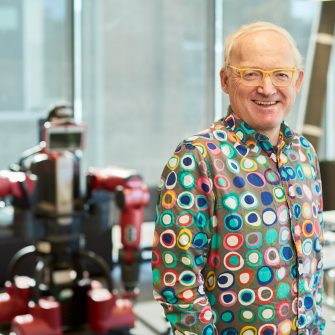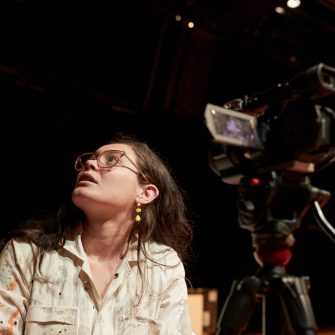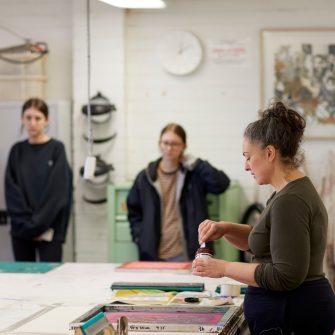Graduate Certificate in Simulation and Immersive Technologies
- Commencing Terms
- Term 1 & 3
- Duration
- 0.7 Year(s)
- Delivery Mode
- Face-to-face (includes blended), Online
- Campus
-
Paddington
- Codes
- Program code 7323
- CRICOS code 099994A
-
2026 Indicative first year full fee
- $19,500*
-
2026 Indicative full fee to complete degree
- $19,500*
-
2026 Indicative first year full fee
- $24,500*
-
2026 Indicative full fee to complete degree
- $25,000*
Application closures for 2026
Undergraduate programs for 2026 intakes are closed for New Overseas Student Commencement (NOSC) applications. Applications for postgraduate programs remain open. Find out if this closure applies to you.
- Overview
- Entry requirements
- What will I study?
- Future careers
- How to apply
- Fees & Scholarships
Overview
The Graduate Certificate in, Simulation & Immersive Technologies will equip you to become a future-ready design leader, capable of understanding and meeting the growing demand of immersive practices across a multitude of industries.
The program offers a unique human-centric, design-led approach focusing on human perception and experience. You'll learn how, why, when and where to effectively utilise simulation and immersive platforms including VR, AR, MR and XR.
Your learning will engage you with these technologies first-hand as you explore real case studies and gain insights from global leaders. You'll develop immersion strategies to tackle specific industry-related problems in your field of interest.
The program caters to the demands of professionals from diverse industry sectors. It can be studied full-time or part-time and is delivered via a range of flexible modalities incorporating online, face-to-face classes and creative studios.
This degree is designed to accommodate the needs of busy professionals from a wide range of backgrounds. You will choose to study fully online, or in blended mode with part-time and full-time options available. In blended mode, you will study core courses online and attend two intensive face-to-face meetups per year on-campus or at our industry partner facilities. You will also have full access to all campus facilities throughout your study.
Key features
Connected to industry
Our courses have been co-created in proud partnership with a wide range of simulation experts and leading organisations. You’ll learn from those working in industries at the forefront of developing and applying visualisation, simulation, and immersive environments. Regular engagement with industry and our extensive creative community networks ensures we keep our program constantly up to date with a rapidly changing employment landscape.
You’ll be encouraged to apply what you learn to areas of industry that interest you by engaging with applications across a diverse cross-section of industries to see the potential scope of these skills and knowledge.
Flexible program delivery
We design our programs to accommodate the needs of busy professionals from a wide range of backgrounds. Our part-time and full-time study options will help you to benefit from innovative low-residency learning experiences.
Why study at UNSW?
- Be supported by our diverse, open and inclusive Arts, Design & Architecture community
- Join a distinctive and in-demand group of graduates with visualisation, simulation and immersive design capabilities.
- Learn through research-informed teaching and content co-created with industry and global experts
- Join our School of Art & Design creative community with a dedicated campus in Paddington and cutting-edge facilities
- Prioritise career success - UNSW has been awarded Most Employable students for six years in a row (Australian Financial Review (AFR) Top100 Future Leaders Awards, 2020–2025)
- Benefit from strong industry links and partnerships
- Access world-class alumni connections
- Join a global top 20 university (QS World University Rankings, 2025)
- Join a community that’s part of the prestigious Group of Eight (Go8) universities
Hear from industry leaders.
Entry requirements
A recognised bachelor’s degree (or equivalent qualification) in any field. The program enables practitioners from a wide range of industry sectors, so entry does not require a degree related to the creative disciplines.
Applicants who do not have a bachelor's degree may apply for admission into the Graduate Certificate based on a minimum 5 years industry experience. To be considered, applicants must provide a digital portfolio (PDF, website, etc.) that includes:
A CV detailing a minimum of 5 years industry experience
5-10 examples of professional achievement (such as examples of work in design, visualisation, simulation, immersive technologies, or descriptions of initiatives they have led, patents, awards, etc.)
A 2 page statement that explains: their specific strengths and achievements in their field; how they see visualisation, simulation and immersive design impacting their discipline; and their motivations for joining the program, and how they believe the program will enhance their career
The digital portfolio will be assessed on a case-by-case basis by Art & Design staff. Students in this category who complete the Graduate Certificate with a WAM of 65 may apply to articulate to the Master of Visualisation, Simulation, and Immersive Design.
Recognition of Prior Learning
Reduce the duration of your degree
You can shorten the duration of your program by applying for RPL for credit. This may include 5 years or more industry experience, formal or informal learning, and approved UNSW Art & Design Short Courses. RPL is usually considered when applying to join a program.
The Graduate Certificate in Simulation and Immersive Technologies which is usually 4 courses or 0.7 years full time can an be shortened by the equivalent of 2 elective courses to a minimum of 2 core courses. This could be completed in as little as 1 term or 0.3 years if undertaken full time.
Moving from Graduate Certificate to Masters
Students in the Graduate Certificate of Simulation & Immersive Technologies who achieve a weighted average mark (WAM) of 65/100 at the end of their study may choose to transfer into the full Master of Simulation, and Immersive Technologies program. This means that if you maintain a credit average grade in your study in the Graduate Certificate, you can continue into a full Masters program without having to hold a Bachelors degree.
English language requirements
You may be asked to provide evidence of your English proficiency to study at UNSW depending on your educational background and citizenship. English language skills are vitally important for coping with lectures, tutorials, assignments and examinations - this is why UNSW requires a minimum English language competency for enrolment.
If you’re completing an Australian Year 12 qualification (e.g. NSW HSC or equivalent), you do not need to provide anything extra to prove your proficiency. Your qualification will be used as evidence of your English proficiency.
If you do need to provide evidence of your English proficiency, this will be indicated in your application. You can prove this by providing evidence that you meet one or more of the following criteria:
- English language tests and university English courses
- Prior study in the medium of English
- Other qualifications
If you need to improve your English skills before you start your degree, UNSW College’s Academic English Programs are for you. The programs are suitable for various English levels and help you prepare for university studies and life in Australia.
For more details, visit the English Language Requirements page.
A recognised bachelor’s degree (or equivalent qualification) in any field. The program enables practitioners from a wide range of industry sectors, so entry does not require a degree related to the creative disciplines.
Applicants who do not have a bachelor's degree may apply for admission into the Graduate Certificate based on a minimum 5 years industry experience. To be considered, applicants must provide a digital portfolio (PDF, website, etc.) that includes:
A CV detailing a minimum of 5 years industry experience
5-10 examples of professional achievement (such as examples of work in design, visualisation, simulation, immersive technologies, or descriptions of initiatives they have led, patents, awards, etc.)
A 2 page statement which explains: their specific strengths and achievements in their field; how they see visualisation, simulation and immersive design impacting their discipline; and their motivations for joining the program, and how they believe the program will enhance their career
The digital portfolio will be assessed on a case-by-case basis by Art & Design staff. Students in this category who complete the Graduate Certificate with a WAM of 65 may apply to articulate to the Master of Visualisation, Simulation, and Immersive Design.
English language requirements
You may be asked to provide evidence of your English proficiency to study at UNSW depending on whether you are from an English-speaking background or non-English speaking background. English language skills are vitally important for coping with lectures, tutorials, assignments and examinations - this is why UNSW requires a minimum English language competency for enrolment.
If English is not your first language, you’ll need to provide proof of your English proficiency before you can be given an offer to study at UNSW. You can do this by providing evidence that you meet one or more of the following criteria:
- English language tests and university English courses
- Prior study in the medium of English
- Other qualifications
If you need to improve your English skills before you start your degree, UNSW College’s Academic English Programs are for you. The programs are suitable for various English levels and help you prepare for university studies and life in Australia.
For more details, visit the English Language Requirements page.
Check the specific English language requirements for this program
What will I study?
UNSW is introducing a new academic calendar from 2028.
We are moving to a new flex-semester calendar. What does this mean for your studies?
Program structure
The Graduate Certificate in Simulation & Immersive Technologies is a 0.7 year full-time program consisting of 4 courses (24 units of credit/UOC), including:
- 2 core courses
- 2 prescribed electives
As well as the technical side of visualisation and simulation, this unique program helps you understand the principles of human experience. This approach will enable you to better design appropriate and effective applications of VR, AR, MR and XR technologies to respond to and address real-world problems for:
- visualising and sensemaking of complex data sets
- designing human centric immersive environments and interactions
- simulating medical and defence procedures
- modelling and planning real world processes
- designing creative and cultural experiences
- researching, experimenting, education and training
Full program structure
Each university year at UNSW has three terms and an optional summer study period.
Some courses need to be studied in your first year, so you’re prepared for courses that can only be studied in later years. You can study full-time or part-time. Depending on how you plan your study load, you can fit two or three courses into a term and one course in a summer term.
Coursework is divided into core and elective courses to establish the following skills, knowledge and experience:
- All students undertake core courses to help you understand how, why, when and where to use immersive technologies and platforms, with a focus on the context of your industry or work. Core courses are conducted online. Students taking a blended option have the opportunity for two intensive face-to-face meetups and full access to all campus facilities throughout each term.
- Elective courses allow you to personalise your study. You can build on existing skills or explore new areas of interest and choose from fully-online or on-campus electives from a range of UNSW faculties.
Through all modes of learning, you’ll have full access to our campus facilities throughout each term.
Below is an example of what you could study in a standard 0.7 year, full-time study plan:
First year
- 2 Core courses
- 2 Prescribed electives
Future careers
This program will provide you with the knowledge and skills to take up a range of high-value positions as design leaders, managers, trainers, artists, researchers, planners, analysts, innovators and entrepreneurs.
Growth industries
Career opportunities are available in a wide range of industry applications, including:
Advanced manufacturing and industry 4.0
Advertising
Architecture, and social and urban planning
Art, design and animation
Business and finance
Defence and national security
Education
Emergency and first response
Engineering
Immersive entertainment and gaming
Medicine, healthcare and sports training
Museology
Robotics
Sustainability and environmental modelling
How to apply
Applications must be submitted through our Apply Online portal. We encourage you to submit your completed application as early as possible to ensure it will be processed in time for your preferred term. Some high-demand programs and Faculties with limited places may have an earlier application deadline or commencement date. Find out more.
Ready to start your application?
For most international students, applications are submitted via our Apply Online service. We encourage you to submit your completed application as early as possible to ensure it will be processed in time for your preferred term.
Some high-demand programs with limited places, may have an earlier application deadline or may have an earlier commencement date. For details, visit the international admissions information page.
Ready to start your application?
Fees & Scholarships
*Fees are subject to annual review (or when required) by the University and may vary accordingly.
Indicative fees are a guide only and have been calculated based on the typical enrolment patterns of students undertaking the program. The indicative fees listed here is an estimate for tuition only and excludes non-tuition fees and charges. The amount you pay will vary depending on the calendar year of enrolment, the courses you select and whether your study load is more or less than 1 Equivalent Full Time Student Load (48 units of credit (UOC) per year).
You should not rely on indicative fees as fee increases are assessed when required and may exceed the indicative figures listed here. Actual fees are calculated on enrolment. More information on fees can be found at the UNSW fees website.
*Fees are subject to annual review by the University and may increase annually, with the new fees effective from the start of each calendar year. The indicative fees listed here are based on an estimated average and are for tuition only, other fees and charges are not included. The amount you pay will vary depending on the calendar year to enrol, the courses you select and whether your study load is more or less than 1 Equivalent Full Time Student Load (8 courses per year).
Indicative fees are a guide for comparison only based on current conditions and available data. You should not rely on indicative fees. More information on fees can be found at the UNSW fees website.
Indicative fees to complete the program have been calculated based on a percentage increase for every year of the program. Fee increases are assessed annually and may exceed the indicative figures listed here.
Indicative fees to complete the program include tuition plus an estimate of study-related costs of approximately $1,000 per year. To find out more about other costs, visit UNSW International.
Scholarships
At UNSW, we award over $83 million in scholarships each year. We pride ourselves on rewarding excellence and making university accessible to students from all walks of life. Whether you’re a domestic or international student, our range of scholarships, prizes and awards can support your journey.
Progress starts here – at a world-leading university

Top 20 Worldwide
Ranked in the global top 20 for three consecutive years
QS World University Rankings, 2024–2026

Winner of the AFR Most Employable University Award six years in a row
AFR Top100 Future Leaders Awards, 2020–2025

Australia's #1 for Innovation
Highest number of startups and spinouts from university-developed tech
SCOPR report, 2024




